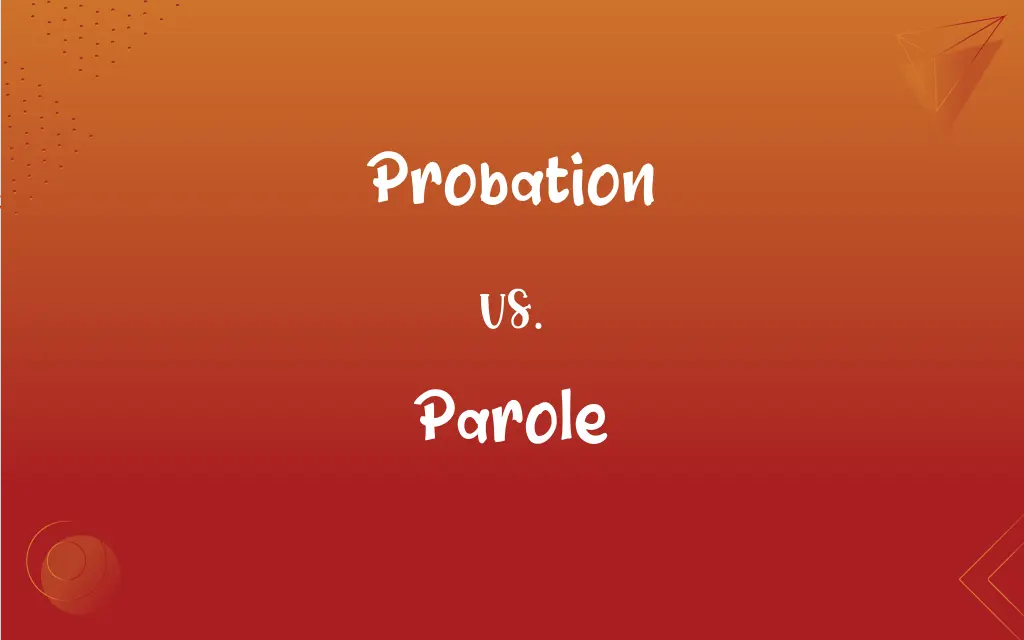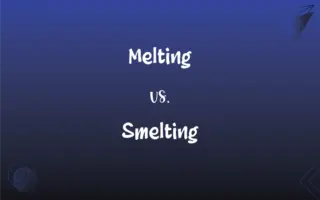Probation vs. Parole: What's the Difference?
Edited by Aimie Carlson || By Harlon Moss || Updated on October 25, 2023
Probation is court-ordered supervision as an alternative to jail, while parole is early release from prison with conditions.

Key Differences
Probation and parole are two methods within the criminal justice system aimed at reintegrating offenders into society, but they differ fundamentally. Probation is often granted by a judge and allows an offender to avoid incarceration. Instead, the offender remains in the community under court-ordered supervision, adhering to specified conditions. Parole, conversely, comes into play after an individual has been incarcerated. It's a supervised, conditional early release from prison.
The underlying principles of probation and parole share similarities. Both are designed to rehabilitate offenders, reduce prison overcrowding, and lower recidivism rates. Probation, being an alternative to jail, is often given to first-time offenders or those committing minor offenses. It emphasizes rehabilitation over punishment. Parole, on the other hand, provides inmates with an incentive to behave well in prison, with the possibility of early release.
Monitoring and adherence to conditions are vital components of both probation and parole. Those on probation might be required to attend therapy, avoid certain individuals, or maintain employment. Likewise, parolees must usually report to parole officers and may have curfews or restrictions on travel. Violating the terms of either probation or parole can result in severe consequences, including being sent to jail or prison.
One significant distinction is the authority that grants probation or parole. Probation is typically decided by a judge during sentencing. It's often perceived as an act of leniency, allowing an offender to prove they can adhere to societal norms. Parole, however, is usually granted by a parole board after evaluating an inmate's behavior, history, and readiness for reintegration into society.
Comparison Chart
Origin
Court-ordered by a judge
Granted by a parole board
ADVERTISEMENT
Purpose
Alternative to incarceration
Conditional early release from prison
Timing
Given at sentencing
After serving part of a prison sentence
Supervision
Overseen by probation officers
Managed by parole officers
Consequence of Violation
Can lead to incarceration
Can result in return to prison
Probation and Parole Definitions
Probation
Alternative sentencing emphasizing rehabilitation.
Probation allows him to attend school and work.
ADVERTISEMENT
Parole
Conditional early release from prison.
After serving five years, he was granted parole.
Probation
Has conditions like therapy, curfews, or drug tests.
As part of his probation, he must attend weekly counseling.
Parole
Has stipulations like check-ins or travel restrictions.
His parole conditions prohibit him from leaving the state.
Probation
A set period during which an offender is monitored.
His probation will last for two years.
Parole
Granted based on behavior and readiness.
Good behavior in prison made him eligible for parole.
Probation
Court-ordered supervision avoiding jail time.
The judge granted her probation instead of a jail sentence.
Parole
Managed by parole officers.
She has bi-weekly meetings with her parole officer.
Probation
Managed by probation officers.
She reports to her probation officer monthly.
Parole
Supervised reintegration into society.
Parole supports inmates in adjusting to life outside prison.
Probation
A process or period in which a person's fitness, as for work or membership in a social group, is tested.
Parole
Early release of a prisoner who is then subject to continued monitoring as well as compliance with certain terms and conditions for a specified period.
FAQs
What is probation?
Probation is court-ordered supervision as an alternative to incarceration.
Who grants probation?
A judge usually orders probation during sentencing.
How is parole granted?
Parole is typically granted by a parole board after reviewing an inmate's case.
What happens if probation is violated?
Consequences can include fines, community service, or incarceration.
What factors influence parole decisions?
Behavior in prison, nature of the crime, victim input, and more.
How long can parole last?
Duration varies, but it's often until the original prison sentence would have ended.
Who determines parole conditions?
The parole board, often in conjunction with parole officers.
How does parole differ from probation?
Parole is a conditional release from prison, while probation avoids jail time entirely.
Can probation conditions be strict?
Yes, conditions can include therapy, drug tests, curfews, and more.
Is parole available for all inmates?
Not always. Eligibility depends on the crime, behavior, and other factors.
Do probationers serve any jail time?
Typically no, unless they violate probation conditions.
Are parolees always monitored?
Yes, usually by parole officers, and they must adhere to set conditions.
Is it guaranteed to receive probation for minor offenses?
No, it's at the discretion of the judge and varies by case.
What happens if someone violates parole?
Violating parole can lead to a return to prison.
Are probation officers and parole officers the same?
No, though their roles are similar, they oversee different processes.
Can probation be extended?
Yes, if conditions are violated, a judge might extend probation.
What's the goal of both probation and parole?
Rehabilitation and reintegration into society.
Can you travel while on probation or parole?
Travel might be restricted; always check with the overseeing officer.
Are probation and parole available worldwide?
Many countries have similar systems, but specifics vary.
Can drug offenses lead to probation?
Yes, especially for first-time offenders or minor offenses.
About Author
Written by
Harlon MossHarlon is a seasoned quality moderator and accomplished content writer for Difference Wiki. An alumnus of the prestigious University of California, he earned his degree in Computer Science. Leveraging his academic background, Harlon brings a meticulous and informed perspective to his work, ensuring content accuracy and excellence.
Edited by
Aimie CarlsonAimie Carlson, holding a master's degree in English literature, is a fervent English language enthusiast. She lends her writing talents to Difference Wiki, a prominent website that specializes in comparisons, offering readers insightful analyses that both captivate and inform.































































